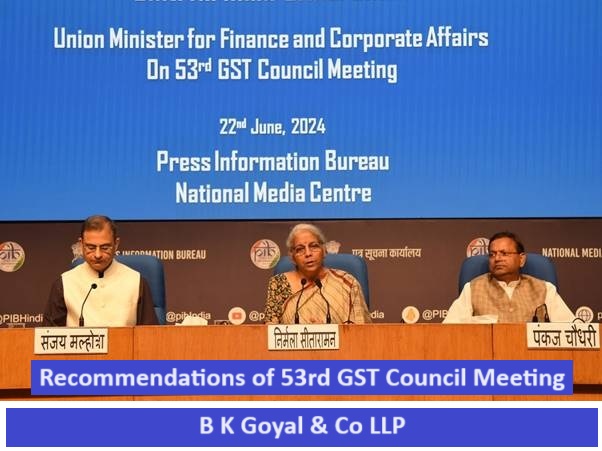GST Registration Online: Documents Required, Limit, Fees, Process, Penalty
Complete Online Document Submission & Application Tracking
- Filing of Application for GST Registration
- Secure GST Temporary Reference Number
- Dedicated CA to process your registration end to end
- Completely Online – No need to visit office
- CA Assisted GST Filing for all your GST needs
What is GST Registration
Under Goods And Services Tax (GST), businesses whose turnover exceeds the threshold limit of Rs.40 lakh or Rs.20 lakh or Rs.10 lakh as the case may be, must register as a normal taxable person. It is called GST registration.
For certain businesses, registration under GST is mandatory. If the organization carries on business without registering under GST, it is an offence under GST and heavy penalties will apply.
GST registration usually takes between 2-6 working days. Team B K Goyal & Co LLP can help you obtain GST registration faster in 3 easy steps.
Who should obtain the GST registration?
- Individuals registered under the Pre-GST law (i.e., Excise, VAT, Service Tax etc.)
- Businesses with turnover above the threshold limit of Rs.40 lakh or Rs.20 lakh or Rs.10 lakh as the case may be
- Casual taxable person / Non-Resident taxable person
- Agents of a supplier & Input service distributor
- Those paying tax under the reverse charge mechanism
- A person who supplies via an e-commerce aggregator
- Every e-commerce aggregator
- Person supplying online information and database access or retrieval services from a place outside India to a person in India, other than a registered taxable person
All about the GST registration process
GST registration can be obtained on the GST portal. One must apply for GST registration in Form REG-01 on the GST portal following steps outlined in our article “How to apply for GST registration?”.
However, the GST registration services at B K Goyal & Co LLP helps you to get your business GST registered and obtain your GSTIN.
Our CA Firm will guide you on the applicability and compliances under GST for your business and get your business registered under GST.
Documents Required for GST Registration
- PAN of the Applicant
- Aadhaar card
- Proof of business registration or Incorporation certificate
- Identity and Address proof of Promoters/Director with Photographs
- Address proof of the place of business
- Bank Account statement/Cancelled cheque
- Digital Signature
- Letter of Authorization/Board Resolution for Authorized Signatory
GST Registration Fees
GST Registration is a tedious 11 step process that involves the submission of many business details and scanned documents. Although there are no fees prescribed under the GST law for obtaining GST registration on the GST portal on your own, you can save a huge time and effort by purchasing the GST registration plan with B K Goyal & Co LLP. You can opt for B K Goyal & Co LLP GST Registration services where a Chartered Accountant will assist you, end to end with GST Registration.
Penalty for not obtaining GST registration
An offender not paying tax or making short payments (genuine errors) has to pay a penalty of 10% of the tax amount due subject to a minimum of Rs.10,000.
The penalty will at 100% of the tax amount due when the offender has deliberately evaded paying taxes
Rolling out of bio-metric based Aadhaar authentication on All-India basis

The GST Council in 53rd GST Council Meeting held on 22.06.2024 recommended to roll-out the biometric-based Aadhaar authentication of registration applicants on pan-India basis in a phased manner. This will strengthen the GST Registration process and will help in combating fraudulent input tax credit (ITC) claims made through fake invoices by taking fake GST Registration.
GST Registration FAQ
Small taxpayers who wish to have lesser compliances to deal with and lower rates of taxes under GST, can opt for the Composition scheme,
A trader whose aggregate turnover is below Rs 1.5 crore can opt for the Composition scheme. In the case of North-Eastern states and Himachal Pradesh, the present limit is Rs.75 lakh. Click here to know all about the Composition scheme.
Also, the government extended the Composition scheme to service providers having an aggregate turnover of up to Rs.50 lakhs. Click here to go through the Composition scheme for service providers.
A. For normal registered businesses:
- Take input tax credit
- Conduct interstate business without restrictions
- Click on the link to know more about the Benefits of GST
B. For Composition dealers:
- Limited compliance
- Lesser tax liability
- Less impact on working capital
- Click on the link to know more about the composition scheme
C. For businesses that voluntarily opt-in for GST registration (Below Rs.40 lakhs*)
- Avail input tax credit
- Conduct interstate business without restrictions
- Easily register on online & e-commerce websites
- Get a competitive advantage compared to other businesses
- Click on the link to know more about voluntary registrations








